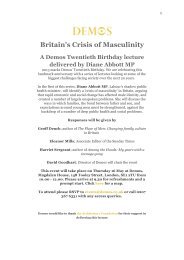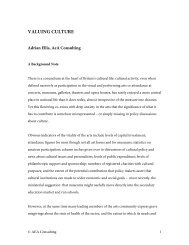Cultural diplomacy - Demos
Cultural diplomacy - Demos
Cultural diplomacy - Demos
You also want an ePaper? Increase the reach of your titles
YUMPU automatically turns print PDFs into web optimized ePapers that Google loves.
<strong>Cultural</strong> Diplomacy<br />
Leonard outlined the four purposes for public <strong>diplomacy</strong> in the<br />
twenty-first century:<br />
� increasing familiarity – making people think about your<br />
country and updating their image of it<br />
� increasing appreciation – creating positive perceptions of<br />
your country and getting others to see issues from your<br />
perspective<br />
� engaging people – encouraging people to see your country<br />
as an attractive destination for tourism and study and<br />
encouraging them to buy its products and subscribe to its<br />
values<br />
� influencing people’s behaviour – getting companies to<br />
invest, encouraging public support for your country’s<br />
positions, and convincing politicians to turn to it as an<br />
ally.<br />
In order to achieve these goals, he argued that public <strong>diplomacy</strong> needs<br />
to operate in three dimensions – and that all three must be covered<br />
for the overall strategy to be effective. First, governments need to deal<br />
with communication on day-to-day issues, which requires them to<br />
align themselves with the news agenda. In particular, they must stop<br />
distinguishing between foreign news stories and domestic ones as if<br />
the audiences were entirely different. Second, they need to use<br />
strategic communication to manage the overall perceptions of their<br />
country. Strategic communication is made problematic by the fact<br />
that different institutions are responsible for managing different<br />
aspects such as politics, trade, tourism, investment and cultural<br />
relations. Third, governments must develop lasting relationships with<br />
key individuals through scholarships, exchanges, training, seminars,<br />
conferences and access to media channels. These relationships are not<br />
built between diplomats and people abroad, but between peers<br />
(politicians, special advisers, business people, cultural leaders and<br />
academics).<br />
<strong>Cultural</strong> activity has an important contribution to make to public<br />
24 <strong>Demos</strong>






